Foreword: The heart of the system continues to evolve
By Bernhard Erdl CEO, Owner, Chief Developer – PULS GmbH
The power supply is the heart of any system. This is a role it has held for decades now, working tirelessly away in the background from inside the cabinet. Recent years, however, have seen the power supply increasingly distance itself from this modest role.
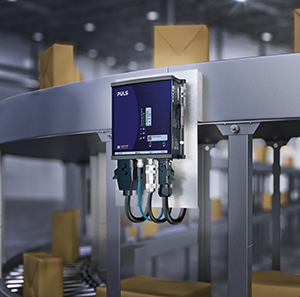 The variety of applications – not to mention the requirements that go with them – are driving this evolution. This implies that, in addition to the essential function of a power converter, there is a growing demand for complete power supply systems featuring integrated communication, redundancy, and protection functions. And then, of course, there is decentralisation, which also has a crucial role to play with regard to power supply and current distribution.
The variety of applications – not to mention the requirements that go with them – are driving this evolution. This implies that, in addition to the essential function of a power converter, there is a growing demand for complete power supply systems featuring integrated communication, redundancy, and protection functions. And then, of course, there is decentralisation, which also has a crucial role to play with regard to power supply and current distribution.
If we want to be able to meet this demand with standard products, a flexible product platform is needed to form the basis for implementing the various solutions. This platform also has to offer the fundamental qualities of a power supply, which include outstanding efficiency, a compact design, exceptional reliability, and a long service life.
It is with all of this in mind that PULS have gone back to the drawing board to develop a new genre of decentralised power supply system, FIEPOS – our decentralised power supply system. The efficient 300 W and 500 W power supplies are accommodated within a very compact housing unit that offers a high level of IP protection (IP54-IP67). These are available in various versions ex stock – including current-limited outputs for selective current distribution, a variety of different plug connectors, IO-Link as a communication interface, and efficient decoupling MOSFETs for developing redundant systems.
The PULS FIEPOS opens up whole new worlds of possibilities for system developers and integrators when it comes to modern system planning. So no matter whether you are looking for a centralised or decentralised solution, PULS is set to ensure that the power supply remains the reliable heart of your system for the foreseeable future.
Decentralised, Cabinet-Free Power Supplies for Smart Manufacturing
By Maximilian Hülsebusch, PULS Power
The demand for flexible modular systems is transforming the world of manufacturing engineering as we know it, and the decentralisation of system components is shaping up to be a major development in this regard. Decentralisation can speed up the system planning process, simplify maintenance tasks, and facilitate straightforward system expansion. More and more system components are being relocated directly into the field now and are required to be provided with a degree of environmental protection from IP54 to IP67. As a result, central cabinets can be made smaller than ever or else dispensed with entirely.
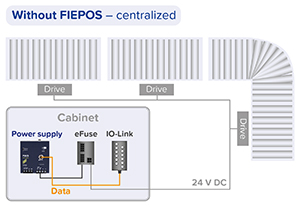 So, what exactly is going on with the power supply in decentralised systems and machine engineering? The products currently available on the market basically follow three different strategies:
So, what exactly is going on with the power supply in decentralised systems and machine engineering? The products currently available on the market basically follow three different strategies:
1. No decentralisation of the power supply – The power supply is not included in the decentralisation process and remains in the central cabinets. In order to supply power to the remote peripheral devices in the field, long cable harnesses have to be installed using costly large cross-section wire to minimise losses and the system power supply has to be oversized to compensate for the loss of performance caused by the long cables.
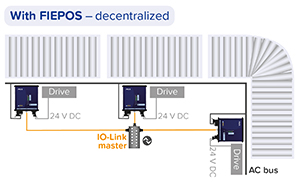 2. Power supply in a decentralised on-site cabinet – The power supply, together with other standard components such as electronic fuses or switches, is taken out of the central cabinet and placed directly onto the machine in smaller, decentralised IP67 cabinets. System builders often handle the planning and assembly of these cabinets themselves.
2. Power supply in a decentralised on-site cabinet – The power supply, together with other standard components such as electronic fuses or switches, is taken out of the central cabinet and placed directly onto the machine in smaller, decentralised IP67 cabinets. System builders often handle the planning and assembly of these cabinets themselves.
3. Customer-specific solution – A customer-specific, decentralised solution is developed especially for the power supply. The size and mechanics are also specifically tailored to the individual system along with the electrical specifications.
Benefits of a decentralised power supply – Many systems integrators have already taken action after recognising the benefits of a decentralised power supply: it starts with the system planning process, which offers greater freedom. There are many applications, such as conveyor belts or production lines that can be supplied with energy much more efficiently and flexibly on a decentralised basis. The power supply no longer has to be oversized, and the individual system parts can be put together on a modular basis, allowing them to be extended, maintained, and converted more quickly and effectively than ever. By making the cabinets smaller, or even doing away with them entirely, the newly gained space can also be used to expand added-value system components. The power cable lengths and cross-sections can be reduced, which in turn saves on the costs of copper.
Past obstacles on the road to a decentralised power supply – The cost of implementing a decentralised power supply does however remain high using currently available solutions. Even straightforward, decentralised on-site cabinets, for example, often comprise more than 10 components. All of these must be purchased, stored, and ultimately combined into a system by a technician. As for developing customer-specific solutions, this is even more time consuming, expensive, and only worthwhile in larger volumes. Until now, there has not been a decentralised standard power supply that is available to order ex stock, is easy to install, and flexible enough to offer a viable alternative in all three of the above scenarios.
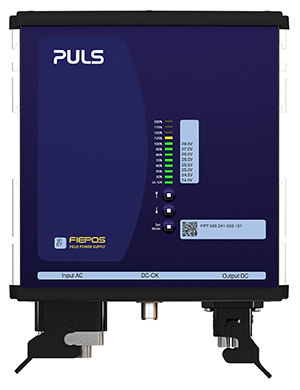 Straight from the cabinet to the field – Relocating the power supply from the control cabinet directly into the field provides an all-in-one power supply system for decentralised systems engineering. It is then possible to use shorter cables and smaller cable cross-sections. This not only saves on the costs of copper, but also on the installation work for the cabling. Local on-board set up and diagnostics makes system commissioning, troubleshooting and maintenance simpler.
Straight from the cabinet to the field – Relocating the power supply from the control cabinet directly into the field provides an all-in-one power supply system for decentralised systems engineering. It is then possible to use shorter cables and smaller cable cross-sections. This not only saves on the costs of copper, but also on the installation work for the cabling. Local on-board set up and diagnostics makes system commissioning, troubleshooting and maintenance simpler.
PULS Cabinet-free power supply system as a solution – PULS are closing this gap in the decentralisation market with the development of their FIEPOS power supply product family. This opens up new worlds of possibilities for systems designers by providing cabinet-free planning of their systems and machines.
The FIEPOS range is based on 1-phase and 3-phase IP54–IP67 power supplies with 300 W or 500 W output power. It also features an IO-Link or output OK signal as a communication interface. The various versions are based on this platform with numerous connector configurations as well as optional safety and redundancy functions.
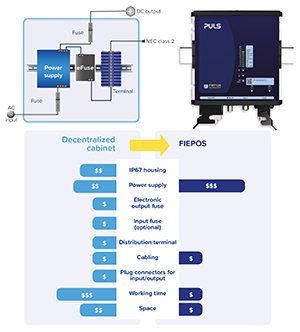 PULS classifies the devices into the two FIEPOS product series of Basic and eFused. The devices in the Basic series have a single output, for which the various plug connectors such as M12-L/-T/-A, 7/8”, or the HAN-Q series are available. In addition, the Basic version is also available with an integrated decoupling MOSFET on the output side and a soft output regulation characteristic. These two functions make the devices particularly useful for assembling reliable redundant systems outside of the cabinet and help to increase performance by establishing parallel connections.
PULS classifies the devices into the two FIEPOS product series of Basic and eFused. The devices in the Basic series have a single output, for which the various plug connectors such as M12-L/-T/-A, 7/8”, or the HAN-Q series are available. In addition, the Basic version is also available with an integrated decoupling MOSFET on the output side and a soft output regulation characteristic. These two functions make the devices particularly useful for assembling reliable redundant systems outside of the cabinet and help to increase performance by establishing parallel connections.
The FIEPOS eFused series comes complete with up to four internally protected outputs. Thanks to the built-in current limit, these devices can easily be used for selective current distribution and protection. The outputs are configured and monitored via IO-Link or via the practical human-machine interface located directly on the front panel of the device.
For more information, contact:
T +44 (0)1525 841001
F +44 (0)1525 841291
sales@puls.co.uk
www.pulspower.com/uk/home
